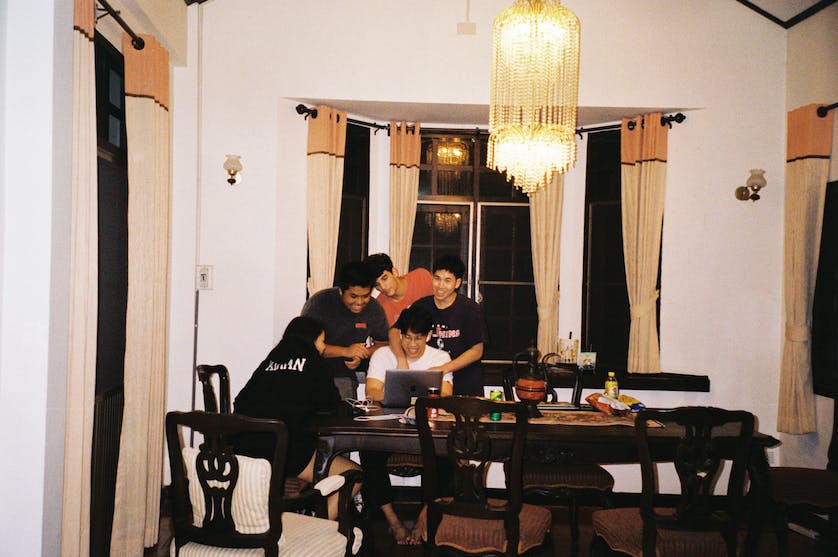Who hasn’t thought, or even said out loud, “Oh! I wish I wasn’t in school right now,” or, “If only I can get this day over with so I can go home!”
These are universal and collective groans of exhausted and overworked students around the world over generations, as we count the hours until the end of the school day or the days until the holidays. A day off school, whether from floods or a teachers’ day, is something to e celebrated and rejoiced over. To have school cancelled has always been simply the best thing ever. Plot twist: it’s not.
As COVID-19 the cases have surged again, students have reverted to the same old routine of online schooling. A routine that may consist of waking up, turning on the computer, and blankly staring at the screen, or learning for a couple of hours, and closing the computer to complete the day. Then, repeat it all over again. The social scene, real interactions, and school space, that many did not realise they needed, have been stripped away, leaving only electronics and the internet as a replacement, often as we sit alone in our rooms. If the past me knew that this would become my reality, I would have been in disbelief.
As millions of students k-12, and beyond, flock to adapt to distanced learning, this rapid change is going to completely reshape our generation and revamp what we know as ‘traditional education’. Some schools and students do not have enough support for this drastic shift online and some are still, over a year later, in the process of figuring out how to bounce back to their fullest potential. As an online student myself, I have learnt to adapt in many ways such as waking up at 4 am to deliver a 5-minute presentation to my class that is 14 hours behind Thai time or learning to take making time for school anytime and anywhere.

There are many mysteries surrounding online learning that many adults or students may never understand because each experience will be uniquely different. I decided to interview Namkhing a fourth-year Chiang Mai University student studying at the Faculty of Economics to see what she has to say about remote learning. As I am starting my degree online, she is finishing it up; our experiences like bookends to a different undergraduate experience.
Me: What do you think about learning online?
Namkhing: Students need to be really clear in their understanding of how their learning will change once it is online. It is so important because this change to online learning is extremely different from an in-person class. For example, group assignments will change. I am on the international side of the Faculty of Economics and we study with a lot of Chinese students. Now with the pandemic, these international students aren’t able to come into the country so assigning group projects is harder. Professors also have to think of alternative ways to give out assignments online.

We have fewer interactions with our classmates to swap ideas. Sometimes in zoom meetings, we are afraid to speak up and it makes other classmates afraid to speak up as well. In a class, I am more confident in answering questions. When the professor asks a question, in a physical classroom, multiple people would try to answer. On Zoom, only a select few are confident to unmute themselves and answer the question. Sometimes, when the professor wants an answer they will randomly call out a student but that does not mean the student will be ready to answer the question. Maybe, there will be someone out there who knows the answer better but is too afraid to open up. Online learning has definitely decreased our time to share ideas. Being out of class, I am stuck in my room with barely any interactions with my classmates or professors so it makes it difficult for me to stay motivated.
Me: What do you think will be affected most?
Namkhing: I think connections will be affected the most. I was in the second semester of my third year in school when COVID-19 hit. My classes are blended and offered to students at different years so I don’t know a lot of people. When we are in a classroom, we recognise each other and what year everyone is in. We might even talk and become friends. Now, I barely know anyone except their names displayed on Zoom.
Me: What are some pros and cons?
Namkhing: Online can be learnt anywhere, which is a plus. However, I feel like I am not getting the full experience and reaching my potential. In a real class, where the professor is right in front of us writing on the board, I am more attentive and responsive to the subject that they are teaching. Zoom makes learning more individualised. We rather ask in the chat later, than unmute ourselves to ask on a live Zoom.
I can agree with many of Namkhing’s insights. The unmuting-to-answer-a-question scare, lack of interaction, and reduced learning are all very real. As she finishes up Chiang Mai University, it often makes me wonders about others who are starting college, high school, or even elementary school because I feel for them, all of them. Students from all across Chiang Mai are navigating this unprecedented time together in very different ways and have different struggles with online schooling. Even reduced to a face on a screen, class roster, or name displayed on Zoom, students are still human and what all humans crave are interactions. This new wave of students ranging from all ages is bright, resilient, and can excel anywhere. As students in this time, we learn that all we can do is just to stay safe, and just do what needs to be done. The fate of online schooling post-pandemic may be as unclear the concept itself, but on a lighter note, we might also never joke about wishing to be someplace but school anymore!
